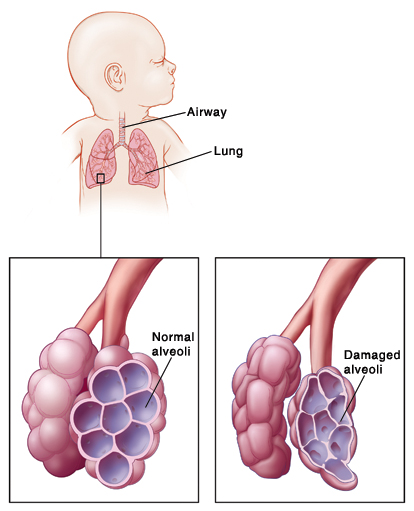Bronchopulmonary Dysplasia in the Premature Infant
Bronchopulmonary dysplasia (BPD) is a lung disorder that causes breathing problems in preterm, low-birthweight babies who need help breathing. Healthcare providers usually care for babies who develop BPD in the neonatal intensive care unit (NICU), or the pediatric intensive care unit (PICU). Over time, the damaged lungs can heal, as the baby grows new lung tissue.

What causes BPD?
BPD sometimes occurs in babies who need life-saving ventilation for long periods. In some cases, the extended ventilation can lead to long-term problems. NICU staff takes steps to prevent these problems, but sometimes they can’t prevent them. BPD occurs when scarring affects a baby's air sacs (alveoli) and the airways inside their lungs. Scar tissue doesn’t function like normal lung tissue. So, babies with BPD have a hard time breathing. They tend to breathe hard and fast while at rest. They may also wheeze or become short of breath. This can get worse if the baby has a cold or is exposed to lung irritants, such as cigarette smoke.
How is BPD treated?
-
Medicine. Certain medicines, called bronchodilators, help open narrow airways. Diuretics help remove excess fluid from lungs. In rare cases, steroids are used to control inflammation and swelling inside the airways.
-
Chest physiotherapy. This helps clear fluid and mucus from the lungs. The nurse or respiratory therapist may first loosen mucus by tapping or vibrating the baby’s chest or back. Changing the baby’s position can also help mucus find its way out of the smaller airways. The nurse or respiratory therapist may then need to suction the baby’s endotracheal tube, if the baby is still on a breathing machine (ventilator). A healthcare provider may teach you to help with chest physiotherapy.
-
Treating other health problems. Babies with BPD may have other health problems. BPD does not cause these. But some health problems, such as infections, can make BPD worse. Treating them may help your baby recover from BPD more quickly.
-
Caring for your baby’s overall health. Reducing stress and stimulation can help calm babies. This makes breathing easier.
-
Extra nutrition. Babies with BPD need extra food to gain weight. This is because they are working hard and using a lot of energy to breathe.
-
Ventilation. This is slowly phased out as lung function improves.
What are the long-term effects?
Many babies with BPD recover quickly. These babies often go home shortly after they are born. But in more severe cases, BPD may need long treatment in the NICU or PICU. When the baby does go home, they may still need medicine, as well as ventilation or supplemental oxygen. These more severe cases of BPD can cause developmental and neurological delays. They can also result in chronic lung disease, such as asthma. Severe cases of BPD can put great emotional, physical, and financial stress on parents and other family members. Don’t hesitate to ask healthcare providers for resources that can help you and your family care for your baby and yourselves in the best way possible.